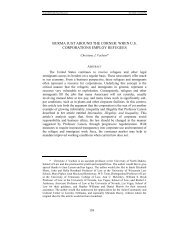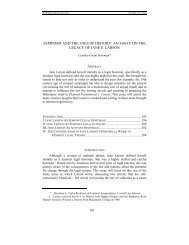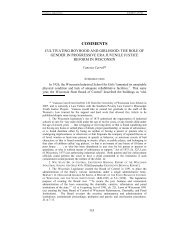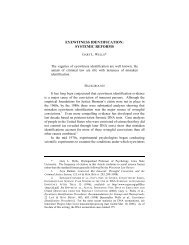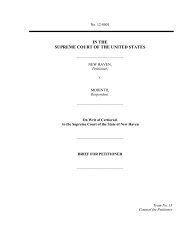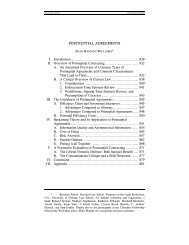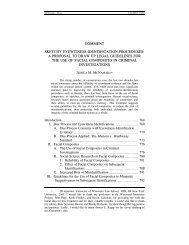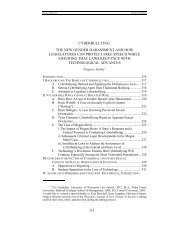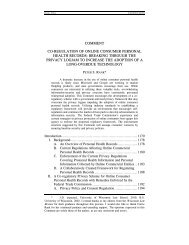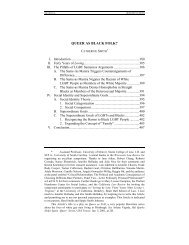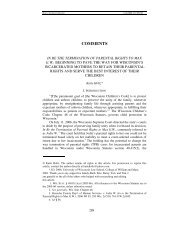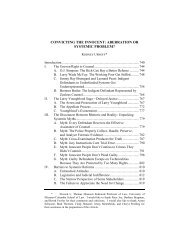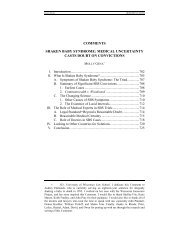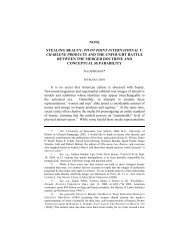note a guide to waiver after echostar and seagate - UW Law School
note a guide to waiver after echostar and seagate - UW Law School
note a guide to waiver after echostar and seagate - UW Law School
You also want an ePaper? Increase the reach of your titles
YUMPU automatically turns print PDFs into web optimized ePapers that Google loves.
BELDEN - FINAL 11/29/2007 4:08 PM<br />
2007:933 A Guide <strong>to</strong> Waiver After EchoStar <strong>and</strong> Seagate 939<br />
II. BACKGROUND TO ECHOSTAR<br />
A. Legal Concepts Central <strong>to</strong> EchoStar<br />
1. THE ATTORNEY-CLIENT PRIVILEGE<br />
The at<strong>to</strong>rney-client privilege is one of the oldest <strong>and</strong> most<br />
important common-law doctrines recognized by the courts. 50 It protects<br />
confidential communications between at<strong>to</strong>rneys <strong>and</strong> their clients by<br />
generally prohibiting discovery of such communications. 51 The<br />
privilege belongs <strong>to</strong> the client, not the at<strong>to</strong>rney, <strong>and</strong> only the client has<br />
the authority <strong>to</strong> waive it. 52 The at<strong>to</strong>rney, therefore, must assert the<br />
privilege in regard <strong>to</strong> confidential communications with the client unless<br />
the client permits disclosure. 53<br />
Courts have long recognized the strong policy justifications behind<br />
the at<strong>to</strong>rney-client privilege. 54 The at<strong>to</strong>rney-client privilege is intended<br />
<strong>to</strong> “encourage full <strong>and</strong> frank communication between at<strong>to</strong>rneys <strong>and</strong><br />
their clients.” 55 Without the privilege, people might choose not <strong>to</strong> seek<br />
the advice of an at<strong>to</strong>rney at all out of fear that their communications<br />
could be subject <strong>to</strong> discovery. 56 At best, clients would selectively<br />
withhold information from their at<strong>to</strong>rneys in an effort <strong>to</strong> avoid<br />
disclosing information that could harm them in future litigation. 57<br />
Without complete <strong>and</strong> honest disclosure on the part of clients, it is<br />
exceedingly difficult for at<strong>to</strong>rneys <strong>to</strong> offer useful legal advice. 58 Such<br />
competent legal advice is considered essential <strong>to</strong> “promote broader<br />
public interests in the observance of law <strong>and</strong> administration of<br />
justice.” 59<br />
50. See EPSTEIN, supra <strong>note</strong> 10, at 2. (“[The at<strong>to</strong>rney-client privilege] was<br />
accepted as early as the reign of Elizabeth I.”).<br />
51. See id. There are several exceptions <strong>to</strong> this rule (such as when the<br />
at<strong>to</strong>rney is being sued by the client for malpractice) under which disclosure of<br />
confidential communications is allowed, see id., but for the purposes of this Note, this<br />
description will suffice.<br />
52. Id.<br />
53. Id.<br />
54. See, e.g., Upjohn Co. v. United States, 449 U.S. 383 (1981); Fisher v.<br />
United States, 425 U.S. 391 (1976); Hunt v. Blackburn, 128 U.S. 464 (1888); United<br />
States v. United Shoe Mach. Corp., 89 F. Supp. 357 (D. Mass. 1950).<br />
55. Upjohn, 449 U.S. at 389.<br />
56. See United Shoe, 89 F. Supp. at 358 (“In a society as complicated in<br />
structure as ours <strong>and</strong> governed by laws as complex <strong>and</strong> detailed as those imposed upon<br />
us, expert legal advice is essential.”).<br />
57. EPSTEIN, supra <strong>note</strong> 10, at 3.<br />
58. See Hunt, 128 U.S. at 470.<br />
59. Upjohn, 449 U.S. at 389.



